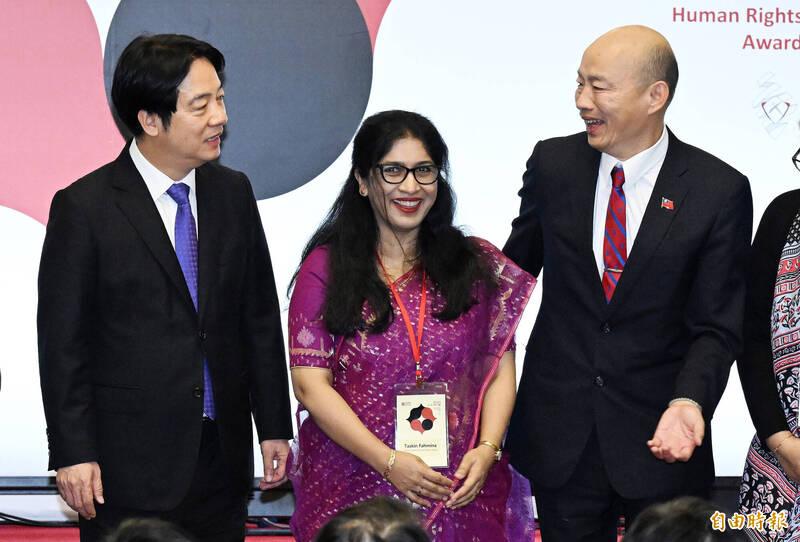Taiwan would continue to strengthen its "democratic defense" capabilities, President William Lai (賴清德) said today as he presented the Asia Democracy and Human Rights Award to Bangladeshi human rights organization Odhikar at a ceremony in Taipei.
The Taiwan Foundation for Democracy recognized international Human Rights Day today by holding the 19th Asia Democracy and Human Rights Award Ceremony, which featured Lai and foundation chairman Han Kuo-yu (韓國瑜) as speakers.
Lai presented the award along with a grant of US$100,000 to Odhikar’s director ASM Nasiruddin Elan, secretary-general Saira Rahman and other organization leaders.

Photo: Liao Chen-hui, Taipei Times
Lai praised the organization for courageously defending human rights in Bangladesh despite facing numerous challenges.
Odhikar has been dedicated to advancing human and political rights for the Bangladeshi public since its founding in 1994, Lai said.
The organization has played a crucial role in oversight and accountability, publishing annual human rights reports that expose overlooked human rights abuses and revealing hidden atrocities for public scrutiny, he said.
Odhikar’s work has not been easy, with leaders constantly facing harassment, surveillance and even imprisonment, Lai said.
Despite this, they have displayed an indomitable fighting spirit, bravely pursuing democracy and earning public admiration, he added.
Like Bangladesh, Taiwan has also endured repressive authoritarian rule, Lai said.
Taiwanese are now able to enjoy a free and democratic life thanks to the efforts of countless human rights defenders, he said.
Taiwan has become a thriving democratic society and stands at the forefront of defending democracy, he said.
In recent years, Taiwan has been working with the Global Cooperation and Training Framework (GCTF) to expand collaboration with international partners, sharing its experiences and strategies to combat disinformation and cognitive warfare, which are common threats for democratic countries, Lai said.
Taiwan would continue to strengthen its democratic defense capabilities and partnerships with other countries to collectively bolster global democratic resilience, he said.
The government must take proactive action and engage in open communication with society, Lai said in a Facebook post today commemorating Human Rights Day.
All sectors must work together to ensure that the path of transitional justice in Taiwan can progress, he said in the post.
Additional reporting by CNA

The High Prosecutors’ Office yesterday withdrew an appeal against the acquittal of a former bank manager 22 years after his death, marking Taiwan’s first instance of prosecutors rendering posthumous justice to a wrongfully convicted defendant. Chu Ching-en (諸慶恩) — formerly a manager at the Taipei branch of BNP Paribas — was in 1999 accused by Weng Mao-chung (翁茂鍾), then-president of Chia Her Industrial Co, of forging a request for a fixed deposit of US$10 million by I-Hwa Industrial Co, a subsidiary of Chia Her, which was used as collateral. Chu was ruled not guilty in the first trial, but was found guilty

DEADLOCK: As the commission is unable to forum a quorum to review license renewal applications, the channel operators are not at fault and can air past their license date The National Communications Commission (NCC) yesterday said that the Public Television Service (PTS) and 36 other television and radio broadcasters could continue airing, despite the commission’s inability to meet a quorum to review their license renewal applications. The licenses of PTS and the other channels are set to expire between this month and June. The National Communications Commission Organization Act (國家通訊傳播委員會組織法) stipulates that the commission must meet the mandated quorum of four to hold a valid meeting. The seven-member commission currently has only three commissioners. “We have informed the channel operators of the progress we have made in reviewing their license renewal applications, and

‘DENIAL DEFENSE’: The US would increase its military presence with uncrewed ships, and submarines, while boosting defense in the Indo-Pacific, a Pete Hegseth memo said The US is reorienting its military strategy to focus primarily on deterring a potential Chinese invasion of Taiwan, a memo signed by US Secretary of Defense Pete Hegseth showed. The memo also called on Taiwan to increase its defense spending. The document, known as the “Interim National Defense Strategic Guidance,” was distributed this month and detailed the national defense plans of US President Donald Trump’s administration, an article in the Washington Post said on Saturday. It outlines how the US can prepare for a potential war with China and defend itself from threats in the “near abroad,” including Greenland and the Panama

Taiwan People’s Party (TPP) Chairman Huang Kuo-chang (黃國昌) yesterday appealed to the authorities to release former Taipei mayor Ko Wen-je (柯文哲) from pretrial detention amid conflicting reports about his health. The TPP at a news conference on Thursday said that Ko should be released to a hospital for treatment, adding that he has blood in his urine and had spells of pain and nausea followed by vomiting over the past three months. Hsieh Yen-yau (謝炎堯), a retired professor of internal medicine and Ko’s former teacher, said that Ko’s symptoms aligned with gallstones, kidney inflammation and potentially dangerous heart conditions. Ko, charged with